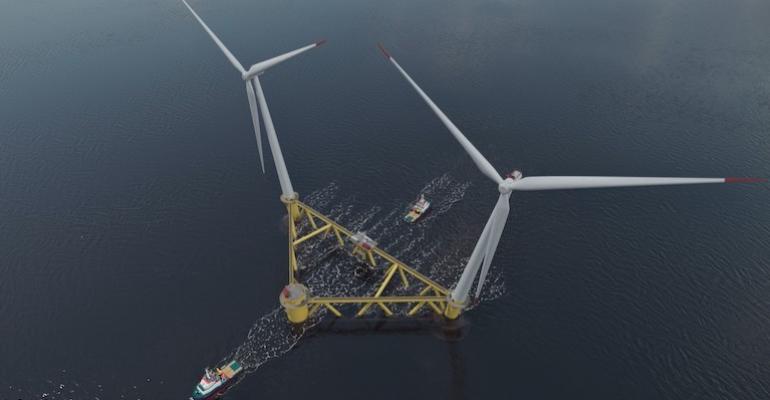Stockholm-based Hexicon AB has clinched 15 years of revenue support from the UK Government, based on a Contract for Difference (CfD) structure, for its TwinHub floating wind project in the UK’s Celtic Sea.
The TwinHub demonstrator project will be located within the Wave Hub demonstration site off Cornwall’s north coast, and will connect to an existing subsea cable which links the site with a substation in the town of Hayle.
The project will have two floating wind platforms, each with two turbines, generating a maximum of 32MW, sufficient to provide power for about 45,000 homes. The platforms will be anchored to the seabed in 50-60 metres of water using a catenary mooring system.
The TwinHub demonstrator will use Hexicon’s patented TwinWind floating foundation technology which, with two turbines per foundation, enables more energy to be generated over a given sea area, with less environmental impact, the company said.
Hexicon described the project, which is supported by US engineering and construction company Bechtel, as an important stepping stone that will stimulate innovation and cost savings. The technology is thought likely to make a significant contribution to the UK Government’s target of 5GW of floating offshore wind by 2030.
The CfD funding structure, the first time this setup has been used for floating wind in the UK, means that Hexicon will receive a fixed price for the low-carbon electricity generated by the project over a 15-year period. Known as the strike price, this has been agreed at £87.30 per megawatt-hour. However, the company will receive any revenue above this price when it sells power into the market.
Commenting on the deal, Marcus Thor, Hexicon CEO, said: “Floating offshore wind is set to play an important role in the UK’s energy system, contributing to the Government’s priorities for energy security and generation of cheap, renewable power. With Hexicon being awarded the first-ever dedicated CfD award for floating wind in the UK, today is a significant moment for us … Our TwinHub project will be the first floating offshore wind project in England and Wales to achieve this milestone and we can now progress to the delivery phase and continue engagement with local communities, stakeholders and regulators, with the support of Celtic Sea Power.”
The TwinHub facility is expected to be commissioned and start generating clean electricity between 2025 and 2027.
Source: Seatrade Maritime News






